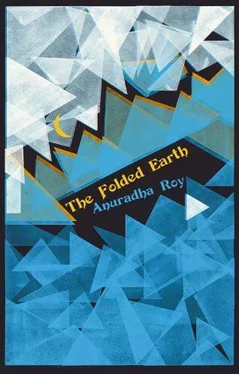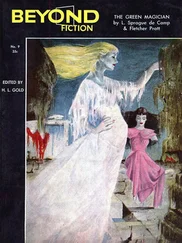Charu and Puran would leave the house early and come back late in a flurry of cowbells and dog barks. Bijli was still an overgrown puppy more inclined to play than shepherd. He leaped before the goats, his front paws slapping the ground, tail furiously wagging. If the goats approached to butt him in response, he took it as encouragement and raced around them barking, sending them up slopes in bleating disarray. Charu’s grandmother said, “This is not a dog, it’s an ass. How will it ever look after the cattle? Even the leopard thinks it’s not worth eating.”
I had heard leopards calling the night before, a hoarse sound much like the sawing of wood. It was very close to the house — I smelled its scent, like that of burned hair and buried myself deeper in my pillow. I wished I had never read Corbett. The leopards in Corbett’s stories were all natives of our hills, and short of opening locks on doors were able to enter almost any house at will, with the kind of intelligence and stealth that nobody imagined animals possessed. Had I remembered to lock the doors downstairs? Were the windows properly bolted? After tossing and turning I got up and checked and then tried to return to sleep again. The next day I heard that the General had almost lost Bozo to the leopard; miraculously, the dog had escaped with a gash on its shoulder.
The day after that I heard Charu’s call for Gouri coming and going, growing louder, then fainter, louder again, hopeful, questioning, despairing, as afternoon purpled into dusk. She wandered up and down every slope that I could see from my windows. The brass bells on the other cows tinkled as they came homeward from the valleys, but Gouri did not appear.
By dusk, a knot of people had gathered outside and the clerk shook his head and pulled on a beedi saying, “Call the girl back, it’s no use.” He bent over the fire outside his house and poked at it. “Take every care you can, but when the leopard wants something he gets it.”
“What do you expect?” Ama said. “We live in the middle of a forest.”
“The other day,” the taxi driver said, “we were standing by the road — at just this time — four of us. And Lachman’s dog was sniffing about right there, two feet from us. Before we knew it, a leopard had come out of the bushes and snatched it away. We chased it with sticks, we shouted and screamed, but it was too quick.”
“And?”
“And, what do you know? It dropped the dog! But by then the dog had died — maybe of fright — but it had a deep wound, dripping so much blood, the road went red. Half its fur and skin was torn off, you could see right down to its bones near the head.”
“That Lachman had paid five hundred rupees for it. And he’d been feeding it a boiled egg every day for the past year. Said it was a valuable guard dog.”
The other man smirked. “The bastard didn’t have money for his wife and children, but he made sure the dog got a boiled egg each day!”
“Boiled!” they said again and held each other, shaking with laughter. “Not even raw, boiled!”
Ama snarled, “Why don’t you get out and help the girl hunt for her cow instead of sitting here telling silly stories?” She hitched up her sari and creaked down the slope with a long stick in her hand, shaking her head at them and muttering.
Charu found Gouri at dawn the next day, in a deep gully. The cow had fallen in awkwardly. Two of its legs jutted at such an odd angle they were certainly broken, and it had a deep wound near its neck. It was alive, but it lay with a still, glazed look, not making a sound. The bell at its neck was red with blood as were the white patches on its mostly dark body.
Everyone gathered around the cow. Charu held out torn pieces of roti to it, eyes streaming tears, saying, “Gouri Joshi, eat something.” She tried to stem the flow of blood from the wound on its neck by stuffing her dupatta against it, but the cloth was soaked in a moment.
“We should call the vet,” I said. “I’ll go.”
“That animal doctor will be no good now; it’s too late,” the clerk said. There was a general murmur of assent.
“If anyone can get it out of there, it’s the Ohjha,” Ama said. “Send someone to call him. But will he come?”
Just three days before, Charu’s grandmother had been holding forth to me about how the Ohjha loathed the new vet. The new vet was a local man who spoke a Pahari dialect, and this had won people’s hearts — the earlier vets had all been strangers from the plains. The new man had cut into the Ohjha’s livelihood. Unlike the vet, the Ohjha was not employed by the hospital. Unlike the vet, the Ohjha had fulminated to Charu’s grandmother, there would be no food on his plate or drink in his glass if sick animals stopped being brought to him. The government paid the vet every month, regardless of how many animals he treated, but who paid the Ohjha? He had to make his way in the world by his own devices. “There he was, sitting in the middle of all the junk at the Kabariwallah’s,” said Ama, “shaking his trident and screaming into his glass of booze, ‘I’ll kick that crazy bastard, the vet, I’ll kick him in the balls!’ I told him, ‘Forget all that, old man, your bijniss is going to go thup , your days are numbered.’ I laughed at him. He won’t come now for me.”
“Why won’t he come? He needs the work,” the taxi-driver said. He got into his cab and drove off to Mall Road to spread the word: anyone who saw the Ohjha was to tell him to come at once.
Ama said, “You don’t believe any of this, Teacher-ni, you city people, but someone’s put a spell on that cow, or an evil wind is blowing curses over it. Or else why did it wander so far this time?”
“Yes, only the Ohjha can do something,” the clerk nodded in sombre agreement.
I said, “Don’t let Charu stay out there all night, it’s too cold and too dangerous.” But her grandmother, realising it would be pointless, did not try calling Charu back home. That evening, she took down a stack of rotis for the cow and food for the girl, helped her make a fire, then hobbled back up. She would do all Charu’s share of the work herself and ask her no questions, however long the cow remained alive; and who could tell, perhaps Charu’s devotion would work a miracle?
The Ohjha came the next afternoon. He lit a fire near Gouri Joshi and threw all kinds of things into it. Little boys from the neighbourhood were made to run up and down the hill many times to cater to the Ohjha’s demands: Ghee! Turmeric! Some uncooked rice! A lemon. Green chillies! A piece of yellow cloth. And so on. He waved his peacock feathers over the cow, chanted, swayed, and shrieked again and again, shaking his head so hard it looked as if it would snap and fall off his neck. Then he went still and quiet. After an interval when everyone waited, respectful and expectant, he gave his verdict: “When the time comes to return to the world of ghosts and spirits, nobody can stand between death and life.” He shook out his robes and feathers, picked up his trident, and walked away. By then, he had deposited charms all over the hillside, eaten three meals at Ama’s house, and pocketed twenty rupees.
Charu remained with the cow all the next day and the day after that. During the day, between grazing their other cattle, Puran came and sat by the cow, stroking it, pressing his own concoction of ground-up herbs to its wounds, and muttering his gibberish into its ear. For some of the time that Puran was there the cow’s eyes appeared to flicker with a suggestion of life, its pain seemed briefly soothed. Then it sank back into a stupor.
Charu had another visitor too. Every evening, when there was no danger of other people, Kundan Singh came stealing down the slope to the forest and sat with Charu till it was time to serve dinner at Aspen Lodge. He collected wood to make a fire near her to keep leopards away. He bought noisy little fireworks from the market to frighten off animals. He went away at mid-evening to resume work and then, after he had served dinner, and his duties were done, he came back with a torch, down the dark slopes, weaving between tree trunks and brambles. He brought whatever food he had been able to squirrel away from the hotelier’s dinner and laid open steel tiffin boxes for her to eat from. He wanted Charu to have the best bits, things she had never eaten: meatballs the first day, chicken the next, then fried rice and egg curry. After eating, they held each other close by the fire, wrapped in a blanket thick enough for the chill of summer nights. Only when sunlight crept up over the ridge did he leave to serve the hotelier and his wife their bed-tea and Marie biscuits.
Читать дальше












